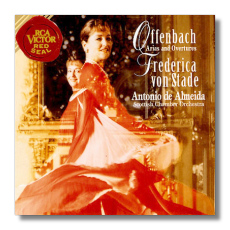
The Internet's Premier Classical Music Source
Related Links
- Offenbach Reviews
- Latest Reviews
- More Reviews
-
By Composer
-
Collections
DVD & Blu-ray
Books
Concert Reviews
Articles/Interviews
Software
Audio
Search Amazon
Recommended Links
Site News
 CD Review
CD Review
Jacques Offenbach

Arias and Overtures
- La Périchole
- La Fille du tambour-major
- La Belle Hélène
- Pomme d'api
- Madame l'Archiduc
- La Romance de la rose
- La Vie parisienne
- Orphée aux enfers
- Barbe Bleu
- La Grande-Duchesse de Gérolstein
Frederica von Stade, mezzo-soprano
Scottish Chamber Orchestra/Antonio de Almeida
RCA Victor Red Seal 09026-68116-2 DDD 65:02
Today, Jacques Offenbach's best-known works are Gaîté Parisienne (which he didn't write) and the atypical Les contes d'Hoffmann (which he didn't finish). At the time of his death in 1880, his best-known works were his comic operettas. Some of these still are performed regularly, even outside of France, and several have received complete recordings in the past thirty years, but a disc of arias is unusual. That's why I requested this CD.
There is some charming silliness to be heard here. A counting song from Pomme d'api is followed by an alphabet song (originally a sextet!) from Madame l'Archiduc. La Périchole's famous drunken song is done with rare… um, spirit by von Stade, who unfortunately doesn't quite live up to Nina Koshetz's celebrated Russian rendition, recorded two generations ago. The heroines on this disc include Helen of Troy, several ladies of questionable virtue, Euridice, and a Grand Duchess who has a weakness for men in uniforms. Orchestral excerpts add variety; one unusual choice is an overture to La Romance de la rose, which, like Flotow's Martha, incorporates "The Last Rose of Summer."
This collection mellows Offenbach's characteristic sparkle. With a voice no longer as flexible as it was twenty years ago, von Stade has to work hard to negotiate the composer's hairpin melodic turns. Her renditions of the arias from La Grande-Duchesse de Gerolstein remind me that Régine Crespin also had attained, as the French say, a certain age when she recorded this role in the mid-1970s. Von Stade marshalls her considerable charms and still-attractive voice throughout; nevertheless, the strain shows, and some of her singing is lumpy. There's little room left for characterization. Her performances are lively and fun, but they are too similar, and they sound far removed from the theater. Almeida, a noted conductor of French opera, is a prior collaborator of von Stade's, and his direction is cut from the same bolt of cloth as her singing is. I'm curious about the editions of the overtures he used, because they are abbreviated from what I'm used to. (For an example, note the 4:04 overture to La Grande-Duchesse.) Are these authentic, or are they simply slashings of the original conceptions?
An attractive disc, but hardly infected with a Parisian spirit.
Copyright © 1996, Raymond Tuttle




















